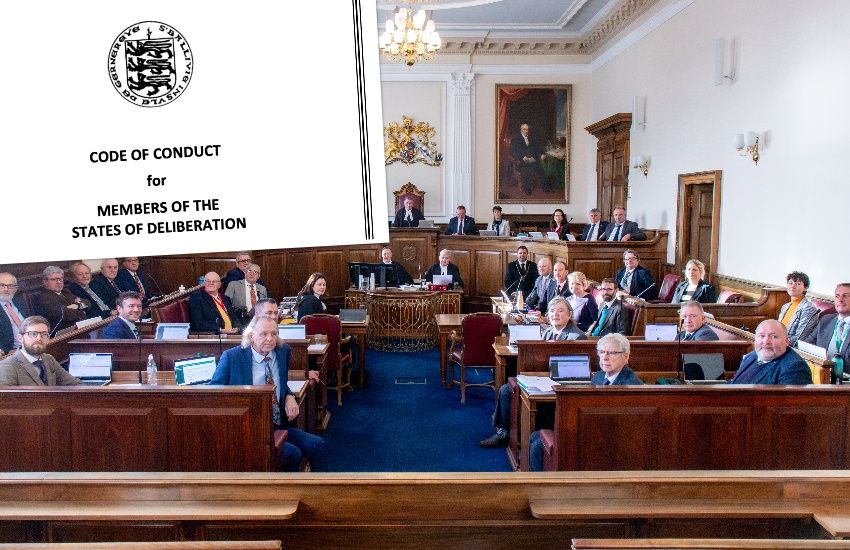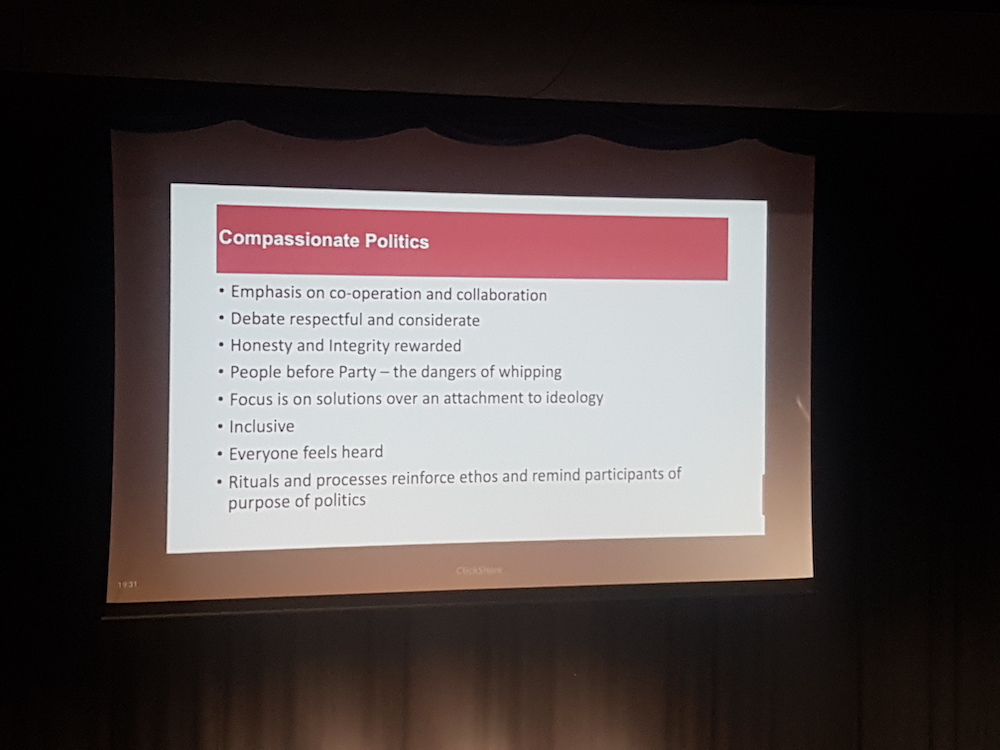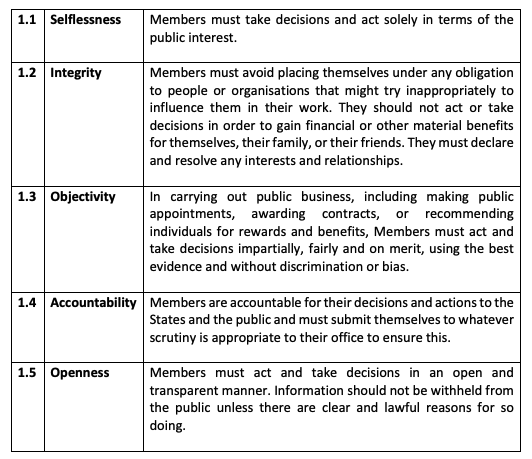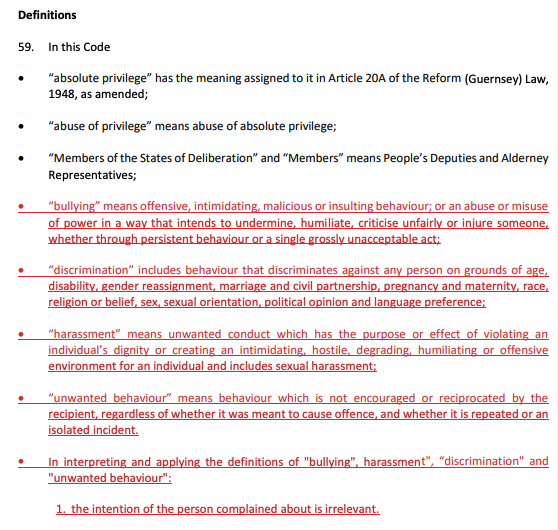


A pressure group which encourages women to stand for public office that’s been lobbying the States to improve conduct has been encouraged by recent engagement but expressed concern about a lack of resources to progress work.
Women in Public Life consulted the States Assembly & Constitution Committee after a public event last year which considered improving standards and behaviour in Guernsey politics.
The event was organised after its members perceived a breakdown in the States after Deputy Heidi Soulsby resigned as Vice-President of the Policy & Resources Committee in 2022.

Pictured: The 'It Doesn't Have To Be This Way' debate last year focused on compassionate politics.
The States has recently approved changes to the code of conduct following recommendations from the pan-island Commissioner for Standards, which includes a formal definition of “unacceptable behaviour”, improved training for politicians, and for a bullying survey to be carried out in the public sector.
While that’s seen as progress, the group has ongoing concerns with behaviours in the States, particularly after a fractious motion of no confidence debate where allegations of bullying were aired. That led to a meeting with SACC two weeks ago to discuss the various issues.
“We'd asked to meet with the Committee to discuss the top five positive suggestions to improve Guernsey politics that came out of our 'It Doesn't Have To Be This Way' event last year. We got all our points across and on the whole the Committee listened and engaged,” Shelaine Green, Chair of Women in Public Life, said.
“Members of our politics group often sit and watch States meetings, but this was their first chance to observe a committee meeting and we're grateful to Deputy Meerveld and the other members and officers for the opportunity.
But she added: “It was concerning to hear how short of resources they are”.
The committee has been without its principal officer for several months, but it was thought that if the work streams are deemed high priority enough Policy & Resources may commission more help.
SACC President, Deputy Carl Meerveld thanked the group for attending since they “have an interest” and can help to shine light on issues as sometimes inside government you “can’t see the wood for the trees”

Pictured: States members are bound by several principles expected of public servants, also including leadership and honesty.
The States agreed some changes to the code of conduct last week.
“Members shall act in good conscience and exercise the privileges and discharge the duties of public office diligently and with civility, dignity, care and honour... members must not engage in unwanted behaviour, harassment, bullying or discrimination,” the new code now reads.
There are also new points advising against the disclosure of information on conduct investigations unless authorised.
“The changes to the deputies’ code of conduct are a big step forward. But we're worried that, on their own, they won't succeed in meet Deputy Trott's stated objective of getting the States to a position where it is more trusted in time for the next election,” Ms Green said.
She said the new code needs to be “brought to life” through snappy summaries and on-going training. It was highlighted that other jurisdictions have easy to read protocols listed on a page in simplified language.
“It’s more upfront where it's a declaration of where we’re trying to go. What’s lacking is the direct point that there’s consensus government and work gets done through working together,” Ms Green said.
The group raised concerns over enforcement of the code of conduct.
SACC noted that behaviours inside the States chamber are always policed by the Presiding Officer, usually the Bailiff, as well as the rules of parliamentary privilege, while outside it’s captured by the code of conduct.
Ms Green said there are some who wish the powers of the Presiding Officers to be used more freely.
She said a common response from members “to even the small things” perceived as negative within States meetings is “this would never happen in my workplace”,drawing comparisons to boardrooms of the 1980s.
There is a sense that if the small things aren't being addressed, “what’s happening with the big things”, she added.

Pictured: Definitions of behaviours have been clarified in the new code.
Deputy John Gollop said while politics has always been “robust” the advent of social media “hasn’t helped”, but he questioned how and who would enforce and hypothetical code of behaviours alongside conduct rules.
But he reported “anecdotal evidence” from other States members that the current atmosphere was “putting off potential high-quality and diverse candidates that politics is for them”.
Deputy Meerveld said they would up to a year to see if the changes to the code proved effective, practically or through deterrent, and then reassess if further modifications are warranted
But Ms Green argued that with just 18 months left of the term, this would be too long to wait if improving relations internally was to be assured.
SACC are committed to bolstering mentoring pre- and post-election. This includes awareness raising for prospective candidates, including what a deputy can and cannot do, and an enhanced induction and training programme following elections.
It will also help educate the public on the function of politicians and the States too.But Deputy Meerveld admitted this work is behind schedule due to staffing issues.
Ms Green said: “We're really keen to help women understand how the States works and we're looking forward to the training that the States will be providing ahead of the next election for both candidates and the public”.

Pictured: Discussion turned to supporting politicians in challenging circumstances too.
Ms Green also highlighted that mental health first aid training was well taken up by local deputies, but it could go further by mirroring a counselling service in Jersey for politicians during code of conduct investigations.
She noted the civil service already had an occupational health resource, and wondered if deputies could access that. But Deputy Meerveld said since politicians are self-employed there are issues accessing workplace support, coupled with the “inhuman expectations of the public to be strong”.
He said when he was 20 the public “had more respect for deputies”, which doesn’t exist in the same way today. But he accepted respect was a two-way street and needed to be earned.
Ms Green accepted that “the public also has a huge part to play in that respect”.
Deputy Gollop said it was “regrettable that politics may naturally attract more alpha people and put off the more insecure and introverted”, particularly given robust debate and public heckling that come with it.
Deputy Liam McKenna suggested that effective deputies “have to stand up and get your point across... you have to rise to criticism and challenge in the rough tough business”.
“People are badly affected by leaving the parliamentary process”
“Unacceptable behaviours” in States won’t be investigated by CI Commissioner for Standards
'Code of Behaviour' suggested to rein in States Members
Women in Public Life: Concerns about political bullying elevated to Commissioner for Standards
Misconduct watchdog now in place – but appeals process to be drawn up
Comments
Comments on this story express the views of the commentator only, not Bailiwick Publishing. We are unable to guarantee the accuracy of any of those comments.